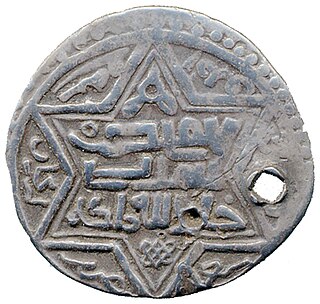Related Research Articles
Amir Chūpān, also spelt Choban or Coban, was a Chupanid noble of the Ilkhanate, and nominal general of the Mongol Empire. He was ennobled by Emperor Taiding of Yuan as Duke of Yi (翊國公).
Baghdad Khatun, was a Chobanid princess, the daughter of Chupan. She was the empress consort of the Ilkhanate as the wife of Abu Sa'id Bahadur Khan.
Ala ud-Din Timurtash was a member of the Chobanids who dominated politics in the final years of the Ilkhanate.
Amir Hasan was a Chupanid prince of the Ilkhanate in the early 14th century. He was the eldest son of Mongol emir and general Chupan.

The Chobanids or the Chupanids were descendants of a Mongol family of the Suldus clan that came to prominence in 14th century Persia. At first serving under the Ilkhans, they took de facto control of the territory after the fall of the Ilkhanate. The Chobanids ruled over Azerbaijan, Arrān, parts of Asia Minor, Mesopotamia, and west central Persia, while the Jalayirids took control in Baghdad.
Hasan Kuchak or Ḥasan-i Kūchik was a Chupanid prince during the 14th century. He is credited with setting up a nearly independent Chupanid state in Iran during the struggles taking place in the aftermath of the Ilkhanate. He effectively became kingmaker like his namesake Hasan Buzurg.
Demasq Kaja or Dimashq Khwāja was a member of the Chobanid family around the first quarter of the 14th century.
Dilshad Khatun, also Delshad, was a Chobanid princess. She was the wife of Ilkhan Abu Sa'id Bahadur Khan, and after him Hasan Buzurg, the first ruler of the Jalayirid Sultanate, and the mother of his son and successor Shaikh Awais.

Shaikh Hasan, also known as "Hasan Buzurg", Hassan the Jalair or Hassan-e Uljatâï was the first of several de facto independent Jalayirid rulers of Iraq and central Iran.
Muhammad Khan was a claimant to the throne of the Ilkhanate.
Sati Beg was an Ilkhanid princess, the sister of Il-Khan Abu Sa'id (r. 1316–1333). She was the consort of amir Chupan (1319–1327), Il-Khan Arpa (r. 1335–36), and Il-Khan Suleiman (r. 1339–1343). In 1338–39, she was briefly the Ilkhanid khatun during internal conflicts, appointed by a Chobanid faction led by Hassan Kuchak.
Suleiman Khan was a Chobanid puppet for the throne of the Ilkhanate during the breakdown of central authority in Persia.
Malek Ashraf, was a Chupanid ruler of northwestern Iran during the 14th century. He was the last of the Chupanids to possess a significant influence within Ilkhanate. His regnal name was Giyas al-Din Shah Malek Ashraf.
The Taichuud was one of the three core tribes of the Khamag Mongol confederation in the Mongolian Plateau during the 12th century, founded by Ambaghai Khan in 1148 AD, and finally ended with Sultan Husayn Tayichud in 1405 AD.

Abbas Zaryab or 'Abbās Zaryāb was a historian, translator, literature Professor and Iranologist. He was the author of several books, including a life of Muhammad, and articles in The Persian Encyclopedia, Western peer reviewed Journals as well as Iranica.

Ala al-Din Eretna was the first sultan of the Eretnids, reigning between 1343–1352 in central and eastern Anatolia. Initially an officer in the service of the Ilkhanate officer Chupan and his son Timurtash, Eretna migrated to Anatolia following Timurtash's appointment as the Ilkhanid governor of the region. He took part in Timurtash's campaigns to subdue the Turkoman chiefs of the western periphery of the peninsula. This was cut short by Timurtash's downfall, after which Eretna went into hiding. Upon the dissolution of the Ilkhanate, he aligned himself with the Jalayirid leader Hasan Buzurg, who eventually left Anatolia for Eretna to govern when he returned east to clash with the rival Chobanids and other Mongol lords. Eretna later sought recognition from Mamluk Egypt to consolidate his power, although he played a delicate game of alternating his allegiance between the Mamluks and the Mongols. In 1343, he declared independence as the sultan of his domains. His reign was largely described to be prosperous, with his efforts to maintain order in his realm such that he became known as Köse Peyghamber.

Abu Sa'id Bahadur Khan, also spelled Abusaid Bahador Khan, Abu Sa'id Behauder, was the ninth ruler of the Ilkhanate, a division of the Mongol Empire that encompassed the present day countries of Iran, Azerbaijan, Georgia, and Armenia, as well as parts of Iraq, Turkey, Afghanistan, and Pakistan. After his death in 1335, the Ilkhanate disintegrated.
Irinjin or Irenjin was a powerful Kerait emir in Ilkhanate and a viceroy of Anatolia.

Muhammad Shirin Maghribi was a Sufi poet and scholar. He is considered one of leading composers of Persian mystical poetry in the 14th-century.
Qurumushi or Qurmushi was an Ilkhanate commander of Keraite origin who served as Mongol viceroy of Georgia.
References
- 1 2 3 Melville & Zaryāb 1991, pp. 496–502.